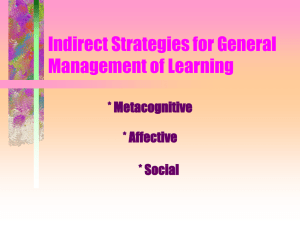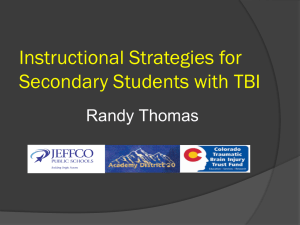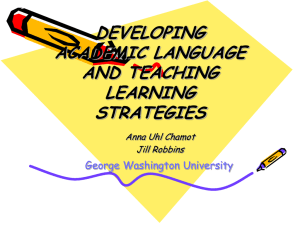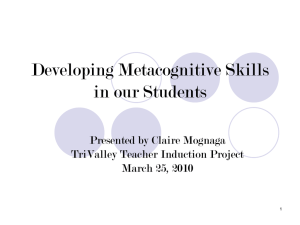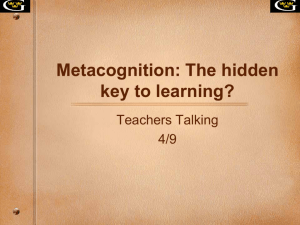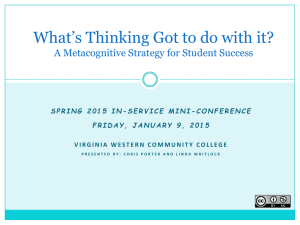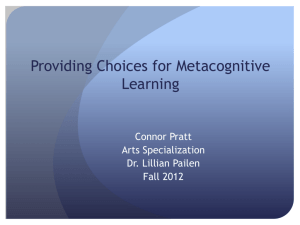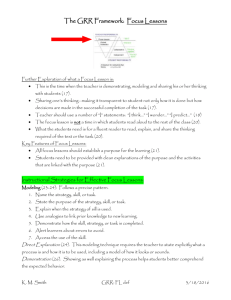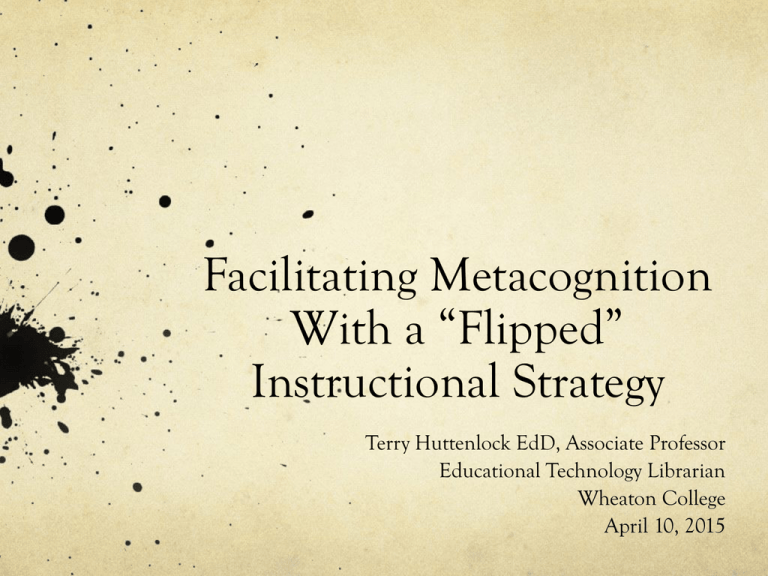
Facilitating Metacognition
With a “Flipped”
Instructional Strategy
Terry Huttenlock EdD, Associate Professor
Educational Technology Librarian
Wheaton College
April 10, 2015
Goals
•
Why use metacognitive strategies?
•
Why use “flipped” pedagogy?
•
How to:
•
•
•
Combine the two in a new library instructional strategy.
Use metacognitive strategies for assessing new strategies.
Why do we need new instructional strategies?
Why Metacognition…?
…deliberate, planful, intentional, goaldirected, future-oriented mental behavior
that can be used to accomplish cognitive
tasks (Flavell, 1979).
Flavell, John H. (1979). Metacognition and cognitive monitoring: A new area
of cognitive-developmental inquiry. American Psychologist, v. 34 (n. 10), 906-911.
Metacognition is, simply put,
thinking about one’s thinking.
Process one uses to:
Plan
Monitor
Assess
Frequently Used Metacognitive
Teaching Strategies
Pre-assessments—Encouraging Students to Examine Their Current Thinking:
“What do I already know about this topic that could guide my learning?”
The Muddiest Point—Giving Students Practice in Identifying Confusions:
“What was most confusing to me about the material explored in class today?”
Retrospective Post-assessments—Pushing Students to Recognize Conceptual
Change:
“Before this course, I thought … Now I think …
Reflective Journals—Providing a Forum in Which Students Monitor Their Own
Thinking:
“What about my research worked well that I should remember to do next time? What
did not work well ? What should I do differently next time?
New ACRL Framework
Scholarship is Conversation:
Value user-generated content and critically evaluate contributions made by
others.
Research as Inquiry
Practice thinking critically when confronting new learning…
Recognize that learning is a process and that reflecting on errors or
mistakes leads to new insights and discoveries.
Depends on information need and context
…maintaining these attitudes and actions requires frequent selfmonitoring
Searching as exploration
Analyze needs at the beginning of information searches
Reevaluate needs and next steps throughout the search process
Why Flipped?
“The flipped classroom describes a reversal of traditional
teaching where students gain first exposure to new material
outside of class, usually via reading or lecture videos, and then
class time is used to do the harder work of assimilating that
knowledge through strategies such as problem-solving,
discussion or debates.”
(Vanderbilt University, Center for Teaching
http://cft.vanderbilt.edu/guides-sub-pages/flipping-the-classroom/ )
Benefits of “Flipped”
Allow self-directed self-paced self-discovery
learning.
Tailor in-person session to needs of
students.
Make relevant and authentic.
Guide rather than prescribe.
Extends the 50-minute one-shot.
How this all began…
Use of an Advance Organizer in the IllStructured Problem Domain of Information
Seeking: A Comparative Case Study.
Mixed methods analysis
Studied the use of an advance organizer
AO based on metacognitive questioning prompts
Question prompts have been found to be an effective
problem-solving strategy.
Premise: Searching is an information problem therefore it
would benefit from the use of problem-solving strategies.
What is an Advance
Organizer?
An advance organizer is relevant introductory materials presented
in advance in any format of text, graphics, or hypermedia.
Different from overviews and summaries that emphasize key ideas.
(Ausubel, 1968).
Examples:
Present a framework for a module or lesson
Organizational cues
Tools that help connect the known to the unknown
Frameworks for helping students understand what it is they'll be
learning
Ausubel, D. P. (1968). Educational psychology: A cognitive view. New York: Holt, Rinehart, & Winston.
Name________________________________Period__________________________Date____________
KWL Chart Template
Copyright © Texas Education Agency, 2011. All rights reserved
Questioning was deliberate and focused
Not prescriptive, worked with
their existing search strategy
mental models
Consciously turned focus away from
search engine interface pausing to
think about their strategy.
Gave an additional learning
goal – to reflect on their
overall strategies
Conclusion: Future studies should explore ways to
embed this into online search environments
Evolution...
Original Advance
Organizer
Research Study
Assignment given
after in-person
research instruction
session.
Assignment
Worksheet with
Guide on the Side
completed BEFORE
in-person research
instruction session.
Flipped instruction
Guide on the Side
Perfect for “flipping.”
http://www.americanlibrariesmagazine.org/
article/guide-side
Guide on the Side
Self-guided
Interactive
http://code.library.arizona.edu/
Guide on the Side
Guiding instructions
Live browser window
Metacognitive
Worksheet
Parallels the principles of
metacognition – plan,
monitor, access.
What is your topic of
interest?
What do you already know?
What are some key
words/terms you can use?
What worked?
What didn’t work?
What would you do
differently next time?
Worksheets…
Reflect on your searching:
What didn’t work?
When I attempted limit by year, I realized that many of the
classic studies were excluded. Also, sometimes when limiting
by document type, important papers were excluded.
What would you do different next time?
I would spend more time examining the sources cited by the
larger articles in order to find the key studies preceding the
current article. I would also read the major studies in full, so
that my growing knowledge would make searching for more
specific articles easier.
What Worked?
Using more keywords in the search does not always help to
narrow a search. It might be better to narrow the search input to
a few specific key words. The time spent looking at every article
to find relevant ones should be saved by using the refining tools.
What would you do different next time?
I would pick a few specific key words to begin the search. I would
also take the time to look at every possible refinement option to
find the best ways to narrow my search. The sorting options
would also help to find articles with particular aspects.
What would you do different next time?
I would make sure that I was refining my search process properly,
and also do more thinking beforehand. Not only would this
expedite my search, but it would make my methodology a lot
more effective.
What didn’t work?
Starting completely over did not work well when
searching, nor did overloading with too many key
words, since I felt this actually limited my results.
What would you do different next time?
Next time I will probably stick with what I felt worked
well for me, starting with a general search, then
refining with key words, but not too many. Next time I
also will not start over every time I try a different
search or try to refine.
What worked?
… Because many of the most recent of the papers investigated
starvation's role in the arrested development dauer state, I
also learned where the research frontier is for starvation
stress in C. elegans.
What would you do different next time?
I would include a search for keywords in the title because it
is particularly satisfying to have a paper title address your
question.
Assessment
Using Metacognitive Principles
Classroom Critical Incident
Questionnaire
Developed by Stephen Brookfield (1994).
The Classroom Critical Incident Questionnaire
Please take about five minutes to respond to the questions below about this weekend’s class
…
•
At what moment in class this weekend did you feel most engaged with what
was happening?
•
At what moment in class this weekend were you most distanced from what
was happening?
•
What action that anyone (teacher or student) took this weekend did you
find most affirming or helpful?
•
What action that anyone took this weekend did you find most puzzling or
confusing?
What did you like about the
library pre-session activity?
It allowed me to learn about the database
interactively.
Made me think about my research project.
Citation search info. Also made class time more
effective.
Reminder of what I had already learned, got me
started in thinking about the upcoming project.
I like how applicable this was.
What did you dislike about the
library pre-session activity?
Reviewed a lot of what we've learned in other classes
- it gets old after a while.
I'm not a big fan of writing short answers about my
research
Took a decent amount of time
Some of the quiz questions weren't really addressed
throughout the assignment.
Would you recommend this as a
worthwhile pre-session activity?
I would probably because I found it useful to know
where I was at with my research "skills."
Yes, even though I've learned it several times, I still
learned something new.
Yes, to make sure everyone is on the same page to
prevent wasting time during the research session.
Probably not-we've learned/interacted with most of
this stuff before.
Support All Literacies
Guide on the
side
Metacognitive
worksheet
Instructional Elements
Metacognitive
Worksheet
Critical
Incident/Reflective
Questionnaire
Assess Outcomes
Metacognitive
Skills
Why do we need to change the
way we teach research
instruction?
Reflection on Project Survey
Think back to a challenging time during your research
project:
What was particularly challenging for your?
What did you do to overcome these challenges?
Think back to when you were working on your project:
What resources did you use for your project?
What did you find most helpful? Least helpful?
What surprised you the most?
Think back to your library research instruction session:
What did you learn?
How difficult were these parts of your project?
100
90
80
Number of Students
70
60
Very Easy
50
Easy
40
30
20
10
0
Challenging
Very
Challenging
NA
Teaching metacognitive questioning is format,
search engine, and “need” neutral. It provides a
foundation to navigate the changing information
and scholarly communication sphere.
_______________________
Combining metacognitive strategies with a “flipped”
instructional strategy has the potential to increase
the effectiveness and application of the ACRL
framework during in-person library research session
and minimize the issue of repetition.
_______________________
New ways to assess effectiveness of instruction such
as using metacognitive tools should continue to be
explored.
Questions?
Terry Huttenlock
Wheaton College
Terry.huttenlock@wheaton.edu

